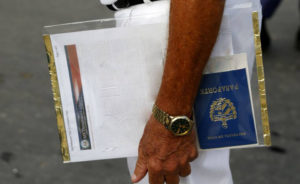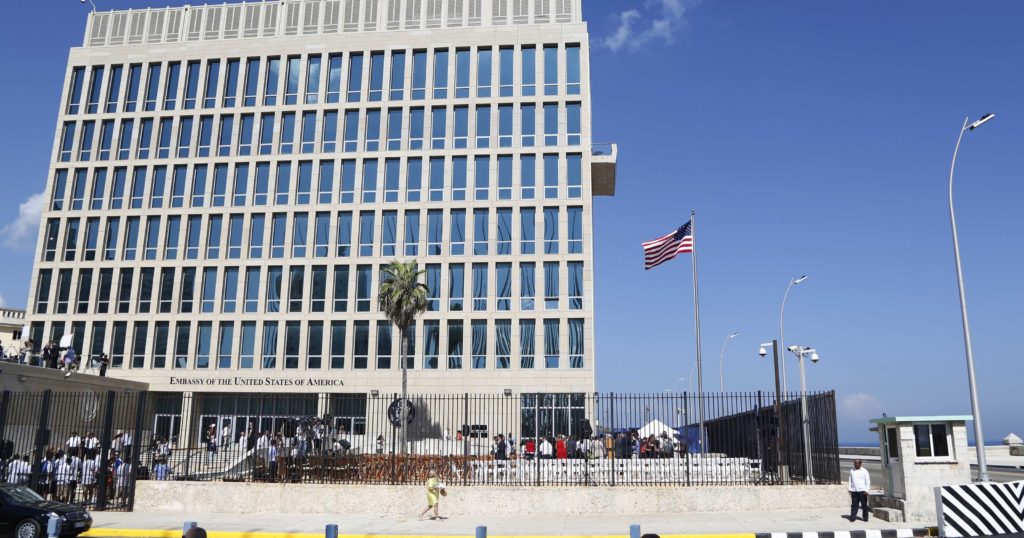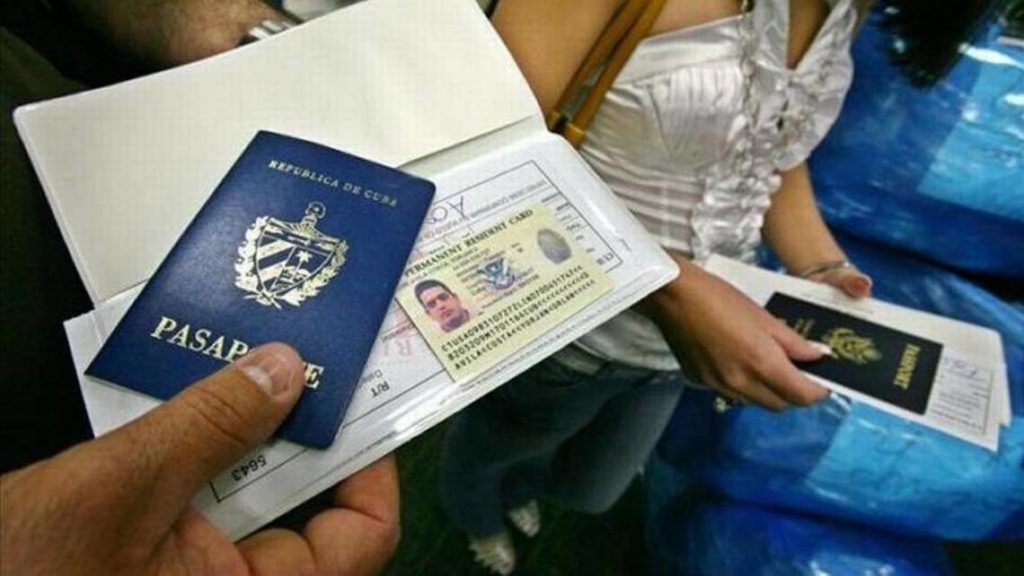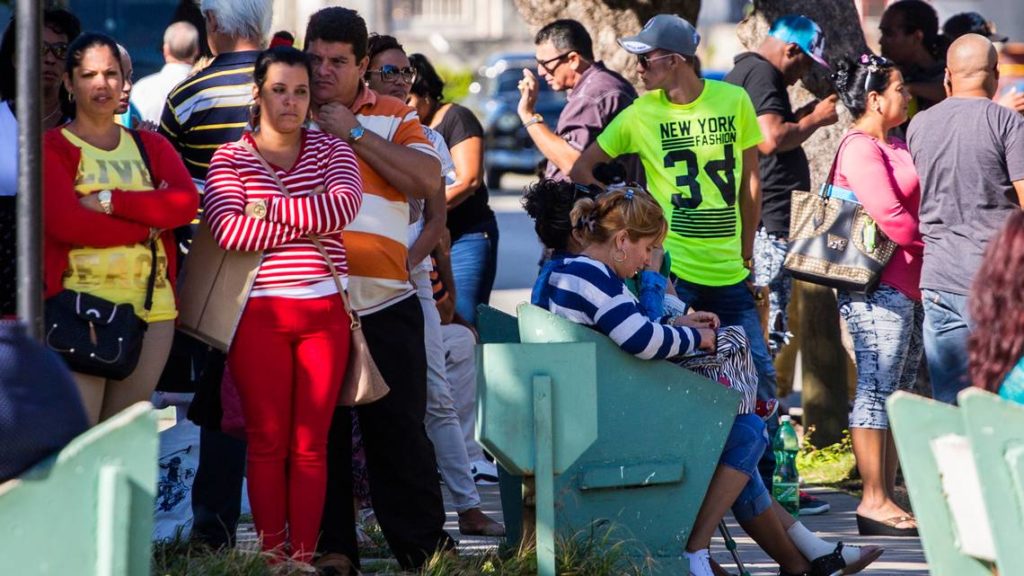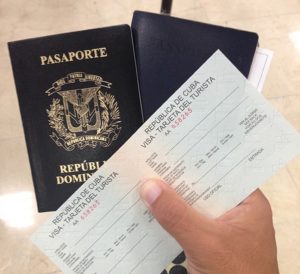 RENEWAL OF U.S. TOURIST VISA TURNS MORE DIFFICULT FOR CUBANS.
RENEWAL OF U.S. TOURIST VISA TURNS MORE DIFFICULT FOR CUBANS.
Cuban immigrants are no longer ‘privileged’ in the United States. The renewal of U.S. tourist visas issued to Cubans since bilateral relations were established in 2015 has turned into a headache for many relatives in Miami.
The B-2 visas, valid for five years, that allowed many Cubans on the island to visit relatives in the United States, are about to expire.
And the renewals, which are up to U.S. consular officials and are not automatic, are more complicated now because many consular functions in Havana were halted after the alleged sonic attacks on U.S. diplomats stationed in Cuba. Applicants must now travel to U.S. consulates in third countries.
miami resident Zuilen Casas has just lived through the laborious process with her mother, a 70-year-old book editor who had already visited her several times and has no intention of staying.
Casas said her mother phoned the U.S. embassy in Havana for information on renewing her visa, which expired in November. She was told to start the renewal process six months before it expired, which she did. She filed an application online, paid the $160 fee and was interviewed at the U.S. Consulate in Merida, Mexico.
“They not only rejected her, but they canceled the six months she had left on the visa,” Casas said. “They told her she was rejected because she had relatives in the United States, meaning she might decide to stay and become an immigrant.
“My mother tried to follow the instructions of the embassy, renewing six months before the visa expired, and look what happened. I think they are punishing her for being a decent person,” said Casas.
She had already bought a plane ticket for her mother and now complains that during the consular interview, her mother was never asked about her ties to the island, where she owns a house and has a job.
“My mother does not want to live in this country [U.S.],” said Casas, who is a U.S. citizen.
Renew or wait?
The choice for Cubans now is whether to follow the embassy advice to renew their visas six months before they expire, or wait until the end.
Miami immigration attorney Santiago Alpizar said Cubans should apply early for renewals, even though changes in U.S. Immigration policies have made it harder for them to win the extensions. It’s best to use the existing visas “as much as possible,” he said.
Wilfredo Allen, another Miami lawyer who specializes in immigration cases, said he recommends applying for renewals at least 90 days before the visas expire, especially because Cubans must now travel to a third country for consular interviews. Allen said it’s generally difficult to obtain U.S. tourist visas, but that once issued, they are often approved for renewal. But he added that it’s important for the visitors not to work or overstay their visas.
“Some Cubans have stayed longer than allowed or have visited very often,” he said. “You have to understand that they can count the days. And that can lead them to cancel or deny the visa.” Allen said Cubans who have more relatives on the island than in the United States, and who have properties and jobs, have a greater chance of renewing their visas.
But he also cautioned that anyone with a visa that expires in 30 days or less can be denied U.S. entry and returned to Cuba.
Family reunification
Alpizar said the most secure way for immigration is through the family reunification process.
“Since the renewal process is not clear, I always advise people who want to bring their families to do it through family reunification,” he said, adding that the U.S. relatives must then promise that they will be financially responsible for the arriving Cubans. The United States reserves the right to allow anyone to enter, and denies the permit if it considers that the person could become a burden on the public,” he said.
U.S. consular officials are aware that Cuban visitors can obtain residence under the Cuban Adjustment Act and then seek government assistance. But those who arrive for family reunification cannot obtain public assistance because their U.S. relatives have promised to support them.
Alpizar added that Cubans who arrive on family reunification visas obtain U.S. residence immediately, meaning they can travel to any other country and remain there for up to six months. He cautioned that Cuban immigrants are no longer “privileged” in the United States, and predicted that the number of visas issued to island residents would continue to shrink.
“They have to take advantage of the rights that exist today, to request the reunification with parents and siblings,” he said, adding that there’s a bill before the U.S. Congress to eliminate preferences for certain categories of extended and adult family members.
Allen added that even though, since October, the United States has not issued any of the 20,000 annual visas set aside for Cubans, relations between the two countries are not as bad as they seem.
“Every day, Cuba is accepting Cubans deported by the United States, which means there are negotiations between the two countries,” he said.
 LA RENOVACIÓN DE LA VISA TURÍSTICA A ESTADOS UNIDOS SE VUELVE MÁS DIFÍCIL PARA LOS CUBANOS.
LA RENOVACIÓN DE LA VISA TURÍSTICA A ESTADOS UNIDOS SE VUELVE MÁS DIFÍCIL PARA LOS CUBANOS.
Los inmigrantes cubanos ya no son ‘privilegiados’ en los Estados Unidos. La renovación de las visas de turistas estadounidenses emitidas a cubanos desde que se establecieron las relaciones bilaterales en 2015 se ha convertido en un dolor de cabeza para muchos familiares en Miami.
Las visas B-2, válidas por cinco años, que permitieron a muchos cubanos en la isla visitar a sus familiares en los Estados Unidos, están por vencer.
Y las renovaciones, que dependen de los funcionarios consulares de EE. UU. Y no son automáticas, son más complicadas ahora porque muchas funciones consulares en La Habana se suspendieron después de los presuntos ataques sónicos contra diplomáticos estadounidenses estacionados en Cuba. Los solicitantes ahora deben viajar a consulados de EE. UU. En terceros países.
La residente de Miami, Zuilen Casas, acaba de pasar por un proceso laborioso con su madre, una editora de libros de 70 años que ya la había visitado varias veces y que no tiene intención de quedarse.
Casas dijo que su madre llamó a la embajada de Estados Unidos en La Habana para obtener información sobre la renovación de su visa, que expiró en noviembre. Le dijeron que comenzara el proceso de renovación seis meses antes de que expirara, lo cual hizo. Presentó una solicitud en línea, pagó la tarifa de $ 160 y fue entrevistada en el Consulado de EE. UU. En Mérida, México.
“No solo la rechazaron, sino que cancelaron los seis meses que le quedaron con la visa”, dijo Casas. “Le dijeron que la rechazaron porque tenía parientes en los Estados Unidos, lo que significa que podría decidir quedarse y convertirse en inmigrante.
“Mi madre trató de seguir las instrucciones de la embajada, renovando seis meses antes de que expirara la visa, y mire lo que sucedió. Creo que la están castigando por ser una persona decente “, dijo Casas.
Ella ya había comprado un boleto de avión para su madre y ahora se queja de que durante la entrevista consular nunca le preguntaron a su madre sobre sus vínculos con la isla, donde es propietaria de una casa y tiene un trabajo.
“Mi madre no quiere vivir en este país [EE. UU.]”, Dijo Casas, que es ciudadano de los EE. UU.
¿Renovar o esperar?
La opción para los cubanos ahora es si seguir el consejo de la embajada de renovar sus visas seis meses antes de que expiren, o esperar hasta el final.
El abogado de inmigración de Miami, Santiago Alpizar, dijo que los cubanos deben solicitar temprano las renovaciones, a pesar de que los cambios en las políticas de inmigración de Estados Unidos han hecho más difícil para ellos ganar las extensiones.
Lo mejor es usar las visas existentes “tanto como sea posible”, dijo. Wilfredo Allen, otro abogado de Miami que se especializa en casos de inmigración, dijo que recomienda solicitar la renovación por lo menos 90 días antes de que expiren las visas, especialmente porque los cubanos ahora deben viajar a un tercer país para entrevistas consulares. Allen dijo que generalmente es difícil obtener visas de turistas en los Estados Unidos, pero que una vez emitidas, a menudo son aprobadas para su renovación. Pero agregó que es importante que los visitantes no trabajen o no se excedan en sus visas.
“Algunos cubanos se han quedado más tiempo de lo permitido o lo han visitado muy a menudo”, dijo. “Tienes que entender que pueden contar los días. Y eso puede llevarlos a cancelar o negar la visa “. Allen dijo que los cubanos que tienen más familiares en la isla que en Estados Unidos y que tienen propiedades y trabajos tienen mayores posibilidades de renovar sus visas.
Pero también advirtió que a cualquier persona con una visa que expira en 30 días o menos se le puede negar la entrada a los EE. UU. Y regresar a Cuba.
Reunificación familiar
Alpizar dijo que la forma más segura para la inmigración es a través del proceso de reunificación familiar.
“Como el proceso de renovación no está claro, siempre asesoro a las personas que quieren traer a sus familias para que lo hagan a través de la reunificación familiar”, dijo, y agregó que los familiares estadounidenses deben prometer que serán financieramente responsables de los cubanos que lleguen. Estados Unidos se reserva el derecho de permitir el ingreso de cualquier persona y niega el permiso si considera que la persona podría convertirse en una carga para el público “, dijo.
Los funcionarios consulares de los EE. UU. Saben que los visitantes cubanos pueden obtener su residencia de conformidad con la Ley de Ajuste Cubano y luego solicitar asistencia del gobierno. Pero aquellos que llegan para la reunificación familiar no pueden obtener asistencia pública porque sus familiares estadounidenses han prometido apoyarlos.
Alpizar agregó que los cubanos que llegan con visas de reunificación familiar obtienen la residencia de los EE. UU. Inmediatamente, lo que significa que pueden viajar a cualquier otro país y permanecer allí por hasta seis meses. Advirtió que los inmigrantes cubanos ya no son “privilegiados” en los Estados Unidos, y predijo que la cantidad de visas emitidas a los residentes de la isla continuaría disminuyendo.
“Tienen que aprovechar los derechos que existen hoy para solicitar la reunificación con sus padres y hermanos”, dijo, agregando que hay un proyecto de ley ante el Congreso de los EE. UU. Para eliminar las preferencias de ciertas categorías de familiares extendidos y adultos.
Allen agregó que a pesar de que, desde octubre, Estados Unidos no ha emitido ninguna de las 20,000 visas anuales reservadas para los cubanos, las relaciones entre los dos países no son tan malas como parecen.
“Todos los días, Cuba acepta a los cubanos deportados por Estados Unidos, lo que significa que hay negociaciones entre los dos países”, dijo.
Agencies/NuevoHerald/Sarah Moreno/Internet Photos/ Arnoldo Varona/ TheCubanHistory.com
THE CUBAN HISTORY, HOLLYWOOD.



